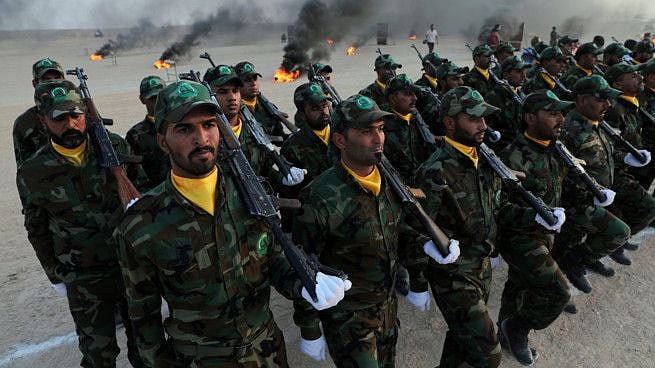Iraq must free itself from self-serving foreign hands
It needs an inspirational leader and a constitution that does not pander to sectarianism

Divided loyalties, competing ideologies, sectarian rivalries and foreign interference combine to tear Iraq apart. This once powerful Arab state that stood as a buffer against Iranian expansionism is in urgent need of a unifier, a strong and charismatic figure who can bring together Iraqis of all faiths and sects under one flag.
Iraq today is in crisis. It is pulled in opposite poles by Iran and the United States that are using, nay abusing, the nation’s soil as a proxy battlefield at a time when there is a caretaker government and Parliament is split along ethno-religious lines.
Roughly speaking, Shiite lawmakers are keen to preserve Iraq’s relationship with its Persian neighbour and want the US military gone, while Sunnis, Kurds and others feel the American presence is needed to guard against a Daesh resurgence and to counter the spread of Persian tentacles.
However, despite President Trump’s stated aim of withdrawing US forces from the Middle East, he has point blank refused the Iraqi government’s request to discuss a troop departure, a decision that garnered the Iraqi Parliament’s approval.
An outraged Trump promptly threatened to freeze Iraq’s bank account in the United States containing its oil revenues that account for 90 per cent of the nation’s budget. In this case Iraq can no longer claim to be a sovereign nation; it is still under US occupation in all but name.
Litany of lies
As for the Iraqi people, they are sick and tired of corrupt and inept politicians sucking the lifeblood out of the economy. Iraq that is Opec’s second largest producer of crude oil leaves its people without jobs, electricity and water while standards of health care and education are way below par.
Over 40 million Iraqis live in poverty even as, according to various sources, some $450 billion (Dh1.65 trillion) in oil revenues have disappeared over the past 17 years since ‘Shock and Awe’ eerily painted Baghdad’s skies red. It is no wonder Iraqis recently took to the streets to demand a new way forward beginning with a new constitution.
Since the 2003 US-led devastation of Iraq on a litany of lies this nation that gave birth to modern civilisation has been in search of an identity. The Bush Administration gifted Iraq to the Islamic Republic next door, created a cauldron of discontent that bore the self-proclaimed Daesh and, worse, cooked-up a highly divisive Constitution based on sectarian/ethnic lines that is a recipe for Shiite dominance.
Did America’s emissaries, headed by US administrator Paul Bremer who issued over 100 laws, disband the Iraqi Army and fired Baathists from the civil service truly believe in the prospect of a flourishing democracy, or did they deliberately set up the country to fail in the hopes that it would be carved-up into three easily manageable pieces that could never again echo Saddam Hussain’s threats against Israel?
Surely, Bremer and Co were not so naive as to believe that democracy could be successfully transplanted to a state lacking democratic institutions and especially one where tribal and sectarian loyalties govern the way the majority votes.
Balkanisation of Arab states
In 2017, the autonomous Kurdish north held a referendum on independence which secured a massive 92 per cent approval. If Sunnis were to decide that they have had enough of the mullahs’ jackboot a homogenous Iraq could easily go the way of the former Yugoslavia, which would be a leaf straight out of the neoconservative play book.
It is worth recalling the ‘Yinon Plan’ — “A strategy for Israel in the 1980s” penned by Oded Yinon, a journalist and adviser to Ariel Sharon. The plan centred on the balkanisation of Arab states, including Iraq, Syria, Egypt and Jordan, into weak bite-sized malleable entities.
As things stand, a sector of Iraq society is keen to kiss goodbye to all vestiges of the American presence while others, among them Shiites, clamour for an end to Iranian diktats. Rather than heed the self-serving demands of tribal, political or religious leaders, Iraqis of all confessions must come together with one inescapably loud voice to demand an end to all foreign meddling in their affairs.
The country needs an inspirational leader capable of winning the respect of all, a revised constitution that does not pander to sectarianism and a renewed sense of Iraqi identity. That is, of course, easier said than done but which can be achieved in a climate of economic growth supported by uplifting government campaigns and education focused on patriotism and national unity.
Iraq has had its fill of puppet masters. Now is the time for Iraqis to show the US and Iran the door while renewing friendships with neighbouring Arab states open to helping Baghdad rebuild the nation anew.
— Linda S. Heard is an award-winning British political columnist and guest television commentator with a focus on the Middle East.
Also Read
Iraq fears turning into a warzone againIraq set for conflict, even if US and Iran de-escalateIraq president Salih urges restraint from Iran counterpart RouhaniNetwork Links
GN StoreDownload our app
© Al Nisr Publishing LLC 2026. All rights reserved.